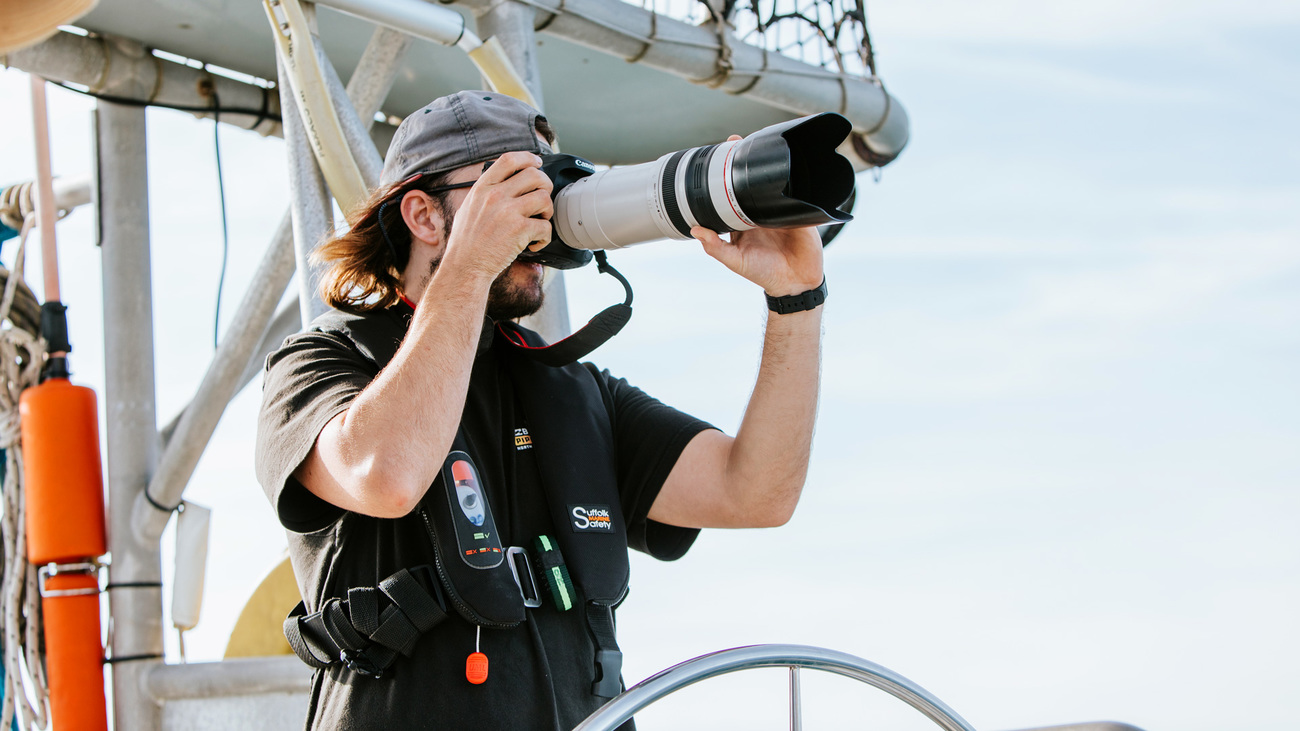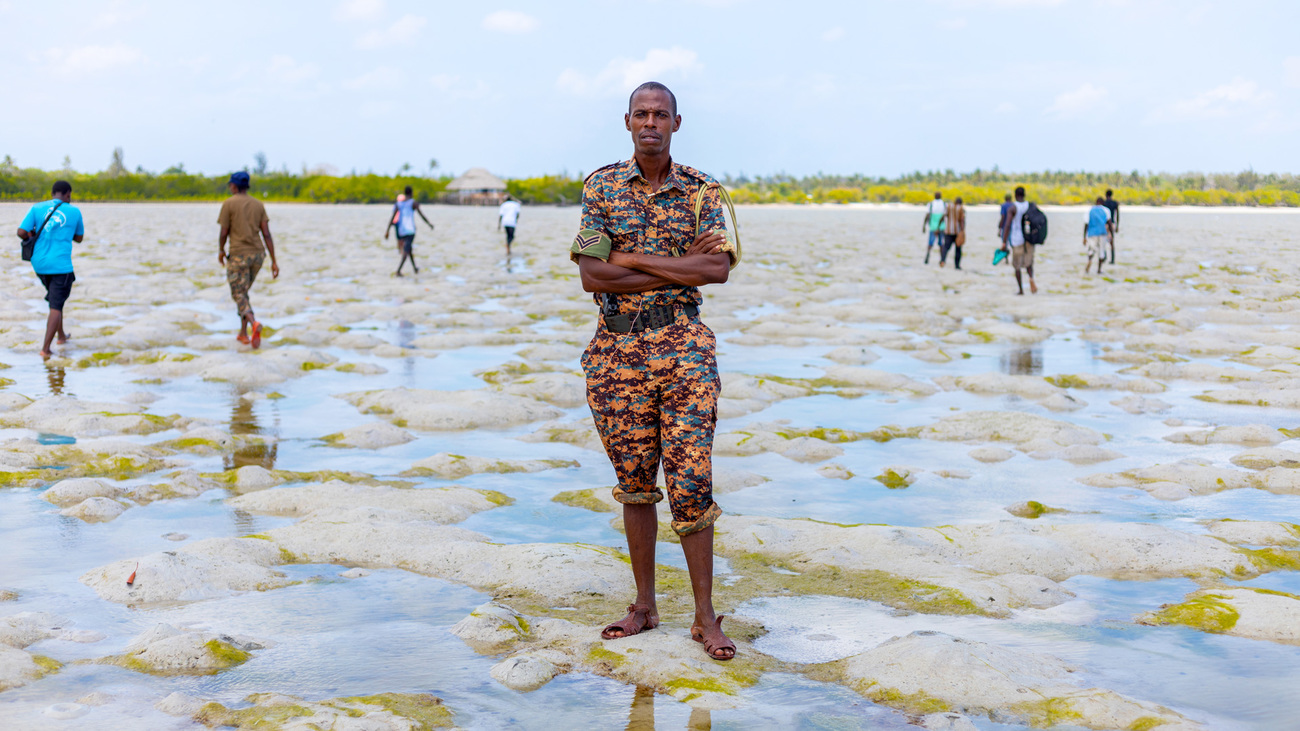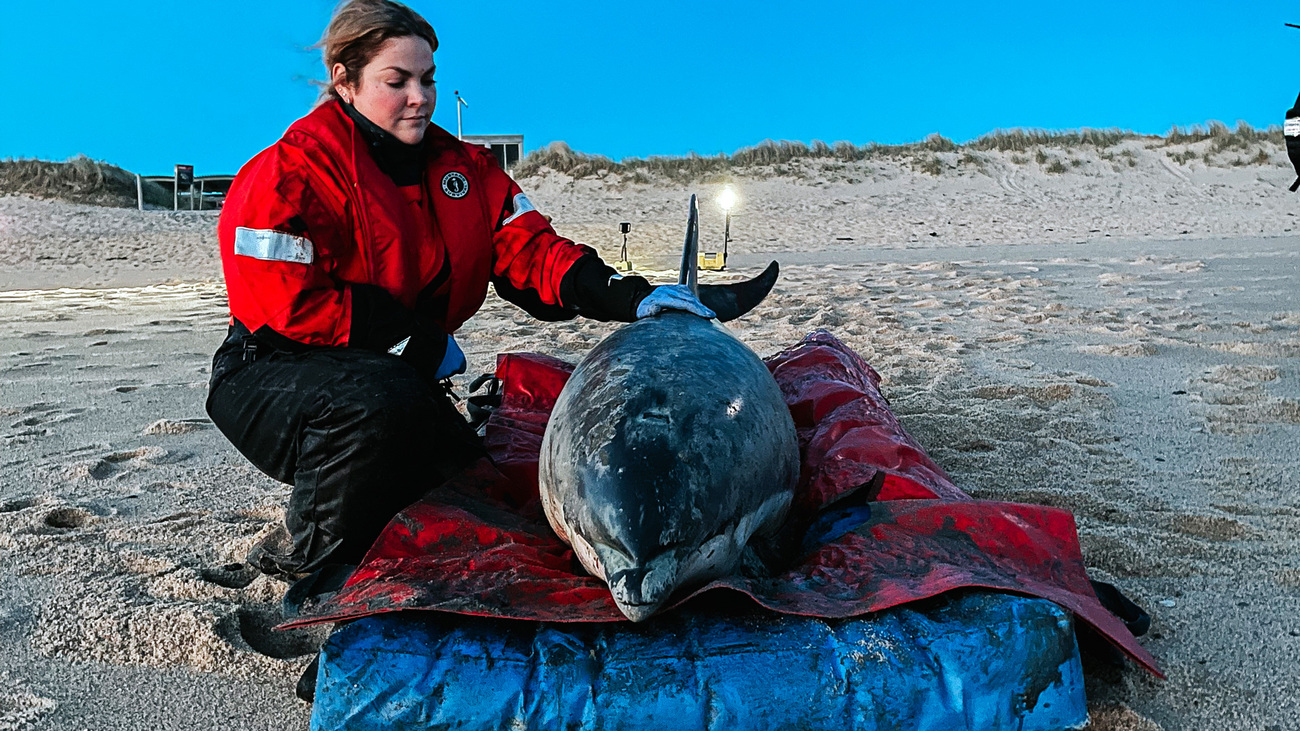Updates
Relief and recovery for animals and people in Myanmar
Read moreHow can you work in marine conservation?
If you care deeply about the environment, the ocean, animals, and combatting climate change, you may be interested in pursuing a career in marine conservation. Working in marine conservation can involve working with nonprofit organisations, governments, schools, and businesses like aquariums.

While finding your dream job can be a long and difficult road—or in this case, an arduous ocean voyage—we are here to help. Here are some frequently asked questions about working in marine conservation and some advice from IFAW’s Right Whale Campaign Officer Katie Seaberg and Marine Conservation Programme Officer Lillian Mulupi.
Marine conservation is the protection and preservation of ecosystems in the ocean. As it provides 80% of the world’s biodiversity, 50% of the world’s oxygen, and 17% of the world’s consumed animal products, the ocean is an important part of our planet. Ultimately, all life on Earth—including humanity—depends on a healthy ocean.
Marine conservation involves protecting vulnerable animal species that inhabit marine environments, including dolphins, whales, sea turtles, seals, coral, and fish. It also entails restoring ocean habitats through methods like growing marine plants, using natural materials like oyster shells, and restoring coral through coral nurseries. In addition, marine conservationists work to reduce or change the human activities that impact these animals, such as overfishing, pollution, whaling, vessel strikes, entanglement, and ocean noise.

Marine conservation work may involve working directly with animals, such as stranded dolphins, entangled whales, or leatherback turtles impacted by hurricanes, to rescue, rehabilitate, and release them back into the ocean.
It may involve policy work, such as working with local or national governments to designate protected areas or enact new vessel speed limits.
Education and community outreach is also an important aspect of marine conservation work. This may involve visiting schools or spreading awareness through local meetings and trainings, or engaging with groups such as local fishermen.
Marine conservationists can also be involved in habitat restoration. This may include growing native marine plants, establishing and maintaining coral nurseries, beach clean-ups, or removing barriers such as dams.
Many marine conservationists are researchers. They may take stock of fish populations, observe the behaviours and migration patterns of whales, or perform necropsies on marine mammals.
Just as wildlife rangers patrol national parks on land, rangers are required to protect marine areas and parks.
As environmentally friendly tourism is often key to funding marine conservation initiatives, many marine conservationists work in the tourism sector.
There are so many different career paths within the marine conservation field, so make sure you do your research into which job best suits your skills and ambitions.
Here are several jobs within the marine conservation field, all differing in the types of skills, requirements, and activities involved:
Many jobs in the marine conservation field require a college degree, while others do not. If you are pursuing a bachelor’s degree, you may want to consider studying biology, marine biology, ecology, zoology, botany, environmental biology, or conservation biology.
If you’re interested in working hands-on with animals through rescue and rehabilitation, you may want to consider going to veterinary school.
You can also gain qualifications and skills such as diving through courses and certification programmes, which can give you a leg up in this field.

The best advice to starting a marine conservation career is to look for volunteer or internship opportunities. Volunteering or completing an internship will equip you with entry-level skills needed to advance further in your career. And it will give you the opportunity to try new things, get your hands dirty, and decide for yourself if this career path is right for you.
If you’re still a student, see how you can get involved with marine conservation at your school. This might involve joining a marine conservation or environmental advocacy club (or starting one yourself), connecting with professors for research opportunities, writing articles for your school newspaper about marine conservation issues, hosting a fundraiser for a marine conservation nonprofit, or organising a class trip to the beach for a clean-up. These are all things you can add to your resume that will help you pursue your future career.
If you’re interested in marine conservation but have a degree or expertise in another field, such as accounting or fundraising, there are still ways you can apply your skills to this cause you care about, such as working for a company, non-governmental organisation, political candidate, or academic institution that supports marine conservation initiatives.
Want to work hands-on with dolphins, whales, and porpoises? Learn more about volunteer and internship opportunities with IFAW’s Marine Mammal Rescue team.
‘Becoming a wildlife conservationist has been a winding journey that has taken me across many disciplines! During college, I had my heart set on becoming an archeologist, and spent my summers working on excavations in the US and abroad. I had the opportunity to work in a small fishing community in Ireland, where I grew interested in the history of human-marine interactions and what insights we could glean for contemporary resource management. Shifting my studies, I worked to gain experience in research and communications sectors to develop practical skills for conservation work.
‘I pursued my master’s in environmental governance shortly after, taking my studies to the UK, where I focused on international marine policy and ecosystem management. I was lucky to find opportunities to conduct research within the country during pandemic travel restrictions, working closely with community groups to investigate ocean conservation practices and collaborating with fellow researchers to conduct at-sea research on the impacts of marine threats to local stakeholders. I found myself continually drawn to the dynamism of the marine environment and the strong relationships local people had with their waters and the life inhabiting them.
‘These experiences solidified my passion for the marine social sciences, and after completing my MSc, I took up a role with one of IFAW’s priority campaigns dedicated to saving the critically endangered North Atlantic right whale. In this role, I get to work across all aspects of our campaign, from spending weeks on a research vessel conducting acoustic surveying, to working with fishermen pioneering innovative gear technologies, to educating the public and policymakers on the plight of an endangered species. Having a social science background has benefited me in the conservation space—incorporating human dimensions is key for successful marine management and ecosystem management in general. I have learned that there are niches for numerous diverse backgrounds across marine conservation and feel incredibly lucky to have found mine!’
‘My career in marine conservation was born out of curiosity and a love for natural places. I enjoy the outdoors and visiting new places, and that is how I encountered the ocean. Most will agree that the ocean fascinates in a unique way.
‘After completing my undergraduate course in Zoology/Chemistry at the University of Nairobi, I spent some time working on a cheetah conservation project. It was nice, but it did end rather abruptly. I was requested to stand in for a colleague who was working on a marine conservation project, and that is how my attention shifted from big cats to the marine ecosystem.
‘I took an internship on a community sea turtle conservation project in Kiunga Marine National Reserve in Lamu, Kenya. The project was supported by World Wide Fund for Nature in collaboration with the Kenya Wildlife Service. Kiunga is a very remote area on the northern coast of Kenya, right on the border with Somalia. The marine environment here is relatively pristine, with expansive mangrove forests, seagrass meadows, healthy coral reefs, and a high diversity of marine animals. The local communities are connected to the ocean; their livelihoods, customs, beliefs, and even leisure activities are greatly influenced by the ocean.
‘I enjoyed working in Kiunga, learning about sea turtles and the entire marine environment, discovering what a wonderful world it is underwater. I also learned to work with local communities, to listen to their concerns and needs and work together to formulate strategies that would ensure animals and people strive together.
‘The experience during my internship gave me a very good foundation. At the end of my term, I was offered a position on the same project. As the project grew in scope, from the Lamu seascape to entire coast of Kenya, so did my roles grow with it. After working for eight years, I had a good grasp of marine conservation. The multi-disciplinary nature of it exposed me to the different components, including the local communities, government agencies, researchers and experts in the different marine ecosystems, maritime security agencies, legislators, private businesses, and investors, that need to work together to make a successful conservation programme.
‘I went on to initiate two successful community-based marine conservation projects before joining IFAW. I am glad to work with IFAW because I get to do marine conservation on an international scale.’
Every problem has a solution, every solution needs support.
The problems we face are urgent, complicated, and resistant to change. Real solutions demand creativity, hard work and involvement from people like you.
Unfortunately, the browser you use is outdated and does not allow you to display the site correctly. Please install any of the modern browsers, for example:
Google Chrome Firefox Safari